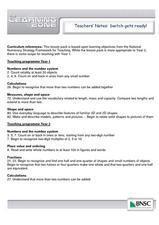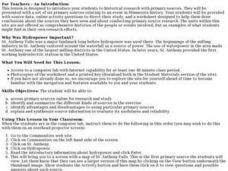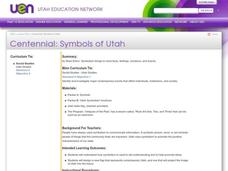Curated OER
Teachers' Notes: Switch Gets Ready!
Students practice multiplication facts, answer simple math questions from two, five, and ten times-tables, explore concept of halves and quarters, complete worksheet containing range of shapes to make shape picture, and sort data and...
Curated OER
Food Webs
Students investigate the concept of an ecosystem and how they are interconnected according to a hierarchy. Students are exposed to the "Lion King" as an example of a food chain and this is very relevant. They answer several key...
Curated OER
Writing About Outdoor Activities
Students discuss what they like about parks and make a list of different things they like to do there such as swing, run, play ball, ride a bike, or go on a hike. They discover the locations of some examples of National Parks and that...
Curated OER
Confronting Genocide
Students discover what the term genocide means and are assigned to groups to reasearch an act of genocide in order to answer each question from their worksheet. They then compare their results making special notes of patterns they observe.
Curated OER
Identifying Propaganda Techniques
In this propaganda techniques worksheet, students write the technique next to the sentence read by a candidate. Students complete 12 problems.
Curated OER
Would You Live Common Law?
Students explore common law. In this sociology lesson, students discover what constitutes common law unions in Canada and then discuss how common law relationships compare to marriages.
Curated OER
Diabetes
Students discuss how behavior can affect health. Students assess their awareness level about Type 2 Diabetes and identify what information is needed to understand factors that can cause Type 2 Diabetes.
Curated OER
Energy Audits for the Elderly
High schoolers perform experiments to determine the nature of energy particularly in air, light and water. They conducted an energy audit using the Energy Audit Checklist and by looking at the school's bills for gas and power.
Curated OER
Activism
Students use a leading question in order to create context for the instructional activity. The use of media helps to engage students with the integration of technology. Students consider major problems of society.
Curated OER
An Introduction:
Students explore historical research with primary sources about Hydropower.
Curated OER
Flowering Philanthropy
Students plant flowers for others. They care for flowers. They summarize experiences through drawing, discussions and writing.
Curated OER
Foreign and Defense Policy: An Overview
Twelfth graders explain why the United States have a policy for its relationship with the rest of the world. They examine their clothing and shoes or other personal items to determine which were manufactured in the US and which in...
Curated OER
Centennial: Symbols of Utah
Fourth graders examine how symbols bring to mind facts, feelings, emotions, and events. They design a new, contemporary flag to promote the state of Utah.
Curated OER
I Will Survive!
Fifth graders explain specialized structure and variation. They describe how some characteristics could give a species a survival advantage in a particular environment. They see how specialized structures and variations help species...
Curated OER
Picture Tomorrow
Students discuss their plans for the future. they draw pictures of something from their future that they plan to do or be. They display their art work in the classroom.
Curated OER
Where You Belong
Young scholars identify different groups to which they belong, and use counting techniques to take a census of their family and class.
Curated OER
Census 2000: Future focus
Students recognize the importance of the census. They identify specific concerns of different population groups. They design an advertisement for Census 2000.
Curated OER
What Death Brings to Life - English Component
Pupils are introduced to the characteristics of ancient Indian, Chinese and Aztec cultures. They consider what was valued by these cultures and compare the cultures' values to their own. They write an essay on their reflections.
Curated OER
Counselors/Teachers
Administrators encourage high schoolers to take as much English, Science and Math as they can. They encourage students to take the most advanced classes they can. They help high schoolers find opportunities to explore medical careers...
Curated OER
What's Going to Happen at Any Given Barometer Reading?
Fourth graders brainstorm a list of words associated with weather. In groups, they sort the words into categories and observe the weather in their area for a month. To end the lesson, they compare the barometer measurements for a...
Curated OER
Is It Lunar or Lunacy?
Sixth graders are introduced to the moon and its phases. Individually, they draw a sketch of each phase of the moon and read a short article about Galileo. To end the instructional activity, they examine the difference between...
Curated OER
Hiding and Seeking Lesson Plan
Students watch a film in order to broaden their view of tolerance after the Holocaust.
Curated OER
Edison National Historic Site
Students use maps, readings and photos to research and describe how Thomas Edison created the first modern laboratory complex. They simulate the process of invention and consider how technological advances have affected their own...
























